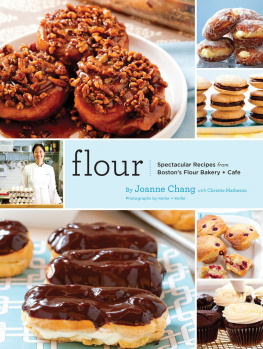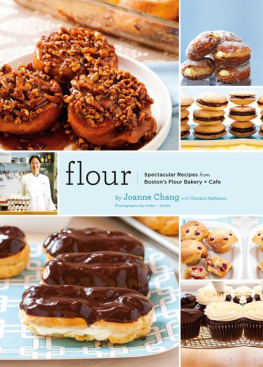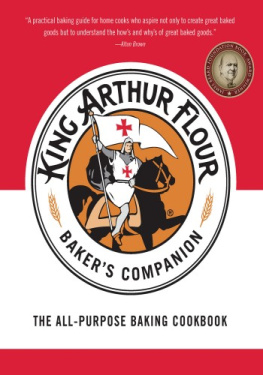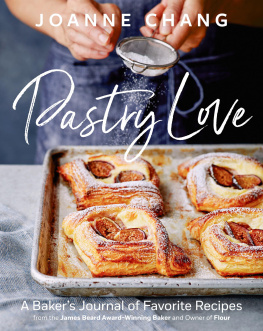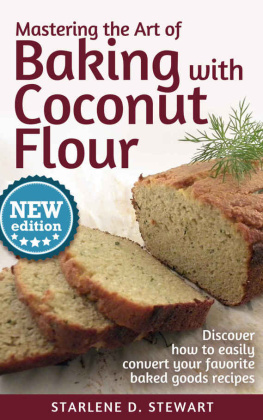
To Christopher, for making my life sweeter every day.
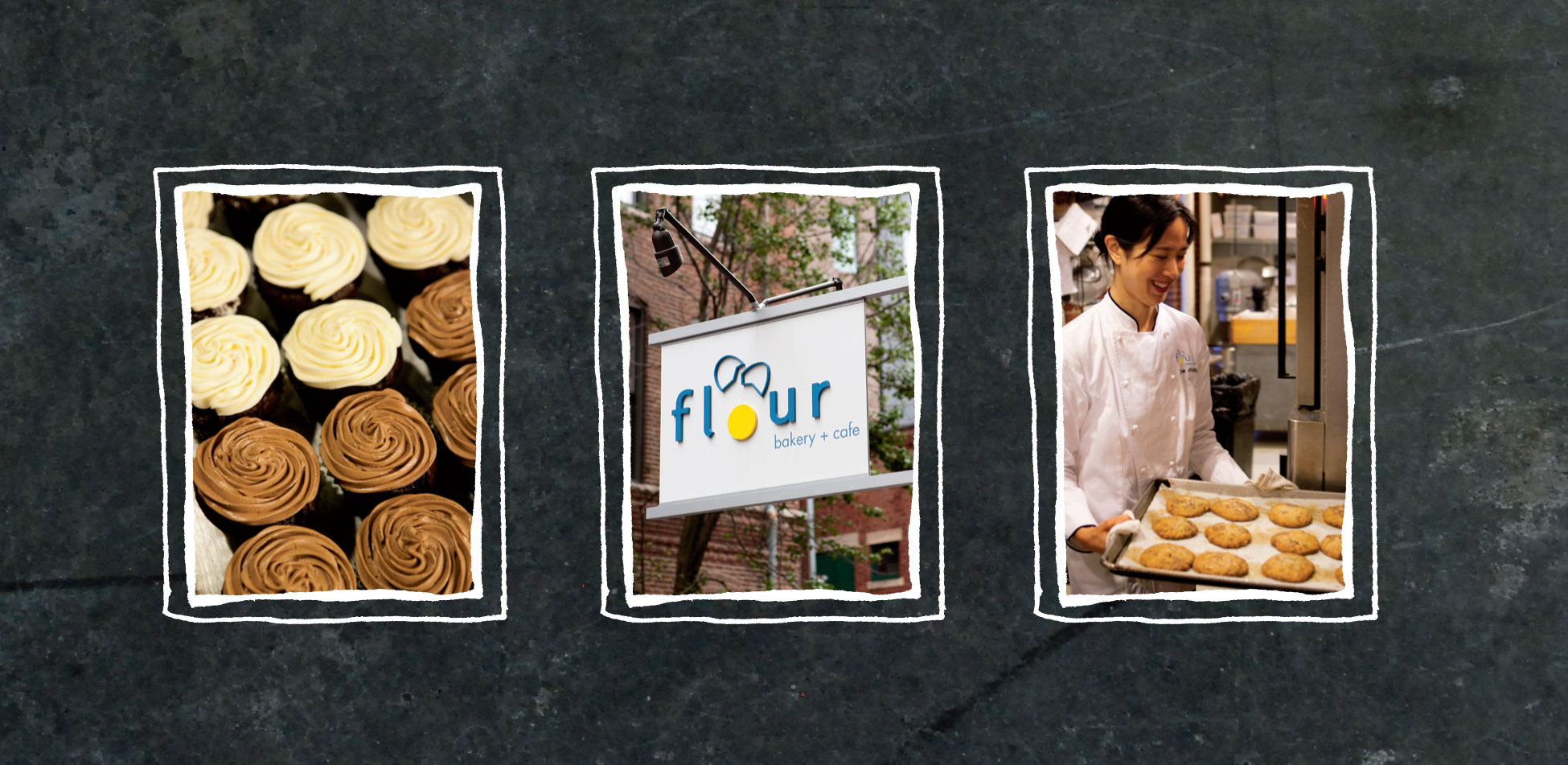
Flour. On its own, its an ordinary ingredient. Likewise, theres nothing special about a cup of sugar, a few eggs, or a stick of butter. But together, these seemingly pedestrian ingredients form the foundation of the magical world of baking.
Being able to create mouthwatering treats from a roster of such basic elements never fails to delight me. Every day I watch as the mixers and ovens and bakers work their magic to create the beautiful pastries that fill the counter at Flour, my bakery. The transformation of humble ingredients into delightful desserts inspires people to exclaim with joy following a single bite. Its a wonderful world to live and work in.
In some ways, baking reminds me of a theoretical math class I took in college. (Bear with me for a moment.) On the first day, we erased from our minds the number system as we knew it. Beginning only with the assumption of the existence of the idea of zero, we spent the next two weeks re-creating the modern-day number system. It seemed like a crazy exercise at the time (and I just barely passed that class), but it taught me that even very complex things start with the most basic building blocks. Baking isnt nearly as complicated as that class was, of course, but everything I bakeat Flour, or at homestarts with the fundamentals. Thats why I named my bakery Flour. Its a reminder that in baking, as in life, simple things are best.
At Flour, we strive for perfection with every recipe we prepare and every item we serve. But that doesnt mean our offerings are complicated or fussy. In fact, the opposite is true. We bake the very best versions of wonderfully familiar and often nostalgic treats, from chocolate chip cookies and banana bread to such commercial classics as Oreos and Pop-Tarts. We wouldnt have it any other way.
In this cookbook, I am thrilled to share dozens of Flours most popular recipes, carefully reformulated to work successfully at home, along with my best recipes for other delicious baked goods Ive developed in more than fifteen years as a professional baker.
Ive adored sweets since I was a little girl, but because I was brought up in a traditional Chinese household, I rarely had the chance to indulge my sweet tooth. Most Chinese meals end with nothing sweet at all. At our house, the occasional dinner with friends would inspire a plate of orange slices and some tea; on special occasions, we would pull out all the stops and serve moon cakes filled with red beans or crunchy almond cookies.
I wasnt introduced to the idea of dessert until I started spending time at my friends houses. Everything I tasted was a novelty to me: Chips Ahoy! cookies, Oreos, Twinkies, Ding Dongs, Jell-O, instant pudding, chocolate cake from Duncan Hines. My sweet tooth knew no bounds. Whenever I could, I would sneak a new dessert.
What started out as a curiosity stemming from my love for sweets eventually developed into a full-blown obsession with desserts and pastries. I pored over baking books and food magazines; I read and reread dessert descriptions wherever I found them; I lingered at pastry cases at the supermarket. Most of the time I never tried the desserts I was dreaming about. Instead, I could only imagine how they must taste: Turkish delight (I read about it in The Lion, the Witch, and the Wardrobe), snickerdoodles (Good Housekeeping), sticky toffee pudding (The Joy of Cooking), double-crust apple pie (Little House on the Prairie), New York cheesecake (first spotted at a Safeway in Houston!). Each one tasted better in my mind than the last.
Although I loved thinking about pastries, I never considered culinary school. I come from a fairly strict Asian family, and my parents expected me to go to college and pursue a practical career. So I went to Harvard and majored in applied mathematics and economics.
At Harvard, I had my first professional baking gig: I baked cookies and sold them at the Leverett House Grill. People loved them, and I became known as the Chocolate Chip Cookie Girl. Even though it was a lot of funand a great distraction from my endless problem setsbaking didnt cross my mind when it was time to look for a job. After all, Id just spent four years and a lot of money (thanks Mom and Dad!) in pursuit of a practical degree, and I was determined to put it to good use.
After graduation, I went to work as a consultant at the Monitor Group, a large international management consulting firm based in Cambridge. It was a good job for someone like me who didnt know what to do for a career. It exposed me to a number of different industries and possible career paths. But none of them was where I wanted to be.
During my second year at Monitor, one of my responsibilities was running the undergraduate recruiting effort. I interviewed hundreds of students for our entry-level consultant position and my opening question, created to break the ice and put anxious students at ease, was What would you do with your life if you won the lottery? Inevitably, I started thinking about my own response to that question. And the answer was easy: I would spend my days cooking and baking. I was always dreaming about food, especially pastries, and how I could make them taste more delicious.
I was tossing that pretty-much-out-of-the-question idea around in my head when I happened to pick up an adult education catalog at the grocery store. A seminar entitled Open Your Own Restaurant caught my eye. The teacher was Judy Rosenberg, founder of the successful chain Rosies Bakery and author of a baking book I had read cover to cover and baked from pretty much every week. I signed up right away.
Rosenbergs advice for people who wanted to bake for a living was simple: go cook or bake! This inspired me to return to baking and selling cookies to those around me. Under the brand name Joannes Kitchen, I baked cookies in my free time for friends and coworkers who were hosting parties or needed housewarming gifts. Finally, in 1993, after finishing two years at Monitorwhen it was time to commit to more years as a consultant, go to business school, or change my path completelyI decided to go for it.
I sent letters to the top chefs in Boston at the timeLydia Shire, Jody Adams, Todd English, Gordon Hamersleyexplaining that I loved to cook and bake, had absolutely no experience or formal training, and was willing to start in any position to work in one of their restaurants. Lydia, who now owns Scampo and Locke-Ober in Boston and then was the groundbreaking chef and owner of the now-defunct Biba restaurant, responded right away. She interviewed me one day and called to hire me the next. Two weeks later, I traded my suit and pumps for a chefs coat and clogs and started as a bar food cook (basically one rung up from dishwasher). My first day, the sous chef asked me to julienne something for her, and I stammered, Wh-whats julienne?
I was pretty clueless, but I learned fast and was soon promoted to the garde-manger (appetizer) position, which just happened to be right next to the dessert-plating area. And while my hands were busy plating up knobby foie gras terrines and mustardy steak tartares, my mind and eyes were mesmerized by the sourdough chocolate cakes, caramelized banana tartes Tatin, and quince-thyme charlottes being plated next to me. I found myself rushing through my work just so I could lend a hand at the pastry station.
After a year of truffle oil, emulsions, and herbs, I asked Lydia if I could transfer to the pastry station. She didnt have an opening but she pointed me in the direction of Rick Katz, Bibas original pastry chef, who had left years prior to open his own bakery called Bentonwood. Once again my path to a new job was somewhat of a whirlwind. I took the train from Boston out to the suburb of Newton to meet Rick, he interviewed me and offered me a job, and two weeks later I made another trade, this time exchanging my chefs knife and tongs for an offset spatula and pastry bags.
Next page
